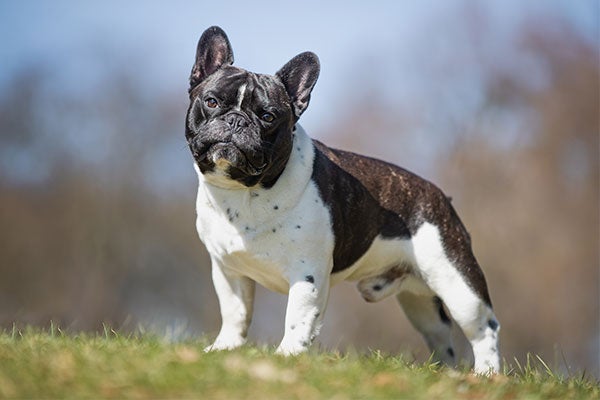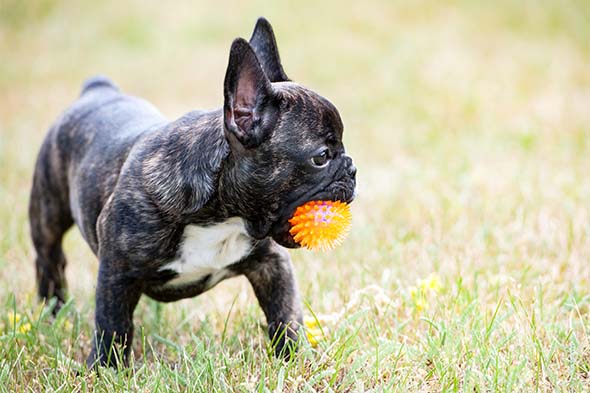The French Bulldog is a beloved breed known for its unique appearance, friendly nature, and charming personality. Did you know that the French Bulldog belongs to the Non-Sporting group in the American Kennel Club (AKC)? This group is a diverse collection of breeds that do not fit into the other established categories. It includes an array of dogs with various characteristics and backgrounds.
The French Bulldog’s inclusion in the Non-Sporting group reflects its rich history and versatility as a companion breed. Originally bred in England as a miniature version of the English Bulldog, the French Bulldog quickly gained popularity as a lovable pet. Today, it is ranked as one of the most popular breeds in the United States. With its compact size, affectionate nature, and adaptability to various living situations, the French Bulldog has won the hearts of many dog lovers. In fact, according to the AKC, it ranked fourth in popularity among all breeds in 2020, showcasing its widespread appeal and connection with people from all walks of life.
The French Bulldog is in the Non-Sporting Group according to the American Kennel Club (AKC). Known for their friendly and adaptable nature, French Bulldogs are beloved companions. As part of the Non-Sporting Group, they are categorized with other breeds that don’t fit into other groups. Other breeds in this group include the Bichon Frise, Lhasa Apso, and Poodle. French Bulldogs are a popular choice for many families due to their charming personalities and cute appearance.

The French Bulldog and Its AKC Group Classification
The French Bulldog is a beloved breed known for its playful and affectionate nature. It has gained immense popularity worldwide and holds a special place in the hearts of many dog lovers. When it comes to its classification within the American Kennel Club (AKC), the French Bulldog falls under the Non-Sporting Group. Let’s explore more about the AKC group in which the French Bulldog belongs.
Non-Sporting Group Overview
The Non-Sporting Group is one of the seven groups recognized by the AKC. Dogs within this group are diverse in size, appearance, and purpose. They do not fit into any other specific group and have various characteristics that set them apart. The Non-Sporting Group is a mix of breeds that have different traits, history, and functions.
The breeds in this group range from small companion dogs to larger ones that were originally bred for specific tasks. Some examples of other breeds within the Non-Sporting group include the Bulldog, Poodle, Boston Terrier, Dalmatian, and Chow Chow. Each breed within the Non-Sporting Group has its own unique qualities and traits that make them special.
French Bulldog Origins
The French Bulldog, also known as the Frenchie, originated in France during the 1800s. It was initially developed as a smaller version of the English Bulldog and gained popularity among French lacemakers in Nottingham, England. The lacemakers brought the breed back to France, where it quickly became a favorite among the city dwellers. The French Bulldog’s charm and lovable personality made it a cherished companion.
Over time, the breed gained recognition and popularity in other countries as well. The AKC officially recognized the French Bulldog in 1898, and it has since become one of the most sought-after breeds.
Characteristics of the French Bulldog
The French Bulldog is a small, muscular dog with a distinctive appearance. It has a compact body, a flat face, and “bat-like” ears. Here are some key characteristics of the French Bulldog:
- Size: The French Bulldog is a small-sized breed, typically weighing between 16-28 pounds.
- Coat: It has a short, smooth coat that comes in various colors, including brindle, fawn, white, cream, and pied.
- Personality: French Bulldogs are known for their friendly, affectionate, and playful nature. They make excellent companions and are great with families.
- Health: While generally healthy, French Bulldogs may be prone to certain health issues, such as respiratory problems and joint conditions. Regular veterinary check-ups are important.
Training and Exercise Needs
The French Bulldog has moderate exercise needs and adapts well to various living environments, including apartments. Daily walks and playtime are essential for their physical and mental well-being. Training should start early to establish good behavior and socialization skills. Positive reinforcement methods work best with these intelligent and eager-to-please dogs.
French Bulldogs as Family Pets
French Bulldogs make wonderful family pets. They are affectionate, loyal, and get along well with children and other pets when properly socialized. Their small size and low exercise requirements make them suitable for families of all sizes, including those with limited space.
However, it’s essential to note that French Bulldogs may not tolerate extreme temperature changes well due to their short snouts. Owners should take necessary precautions to keep them safe and comfortable during hot or cold weather.
Conclusion
The French Bulldog is a delightful breed that brings joy and companionship to many households. Its classification within the AKC as part of the Non-Sporting Group highlights its uniqueness and distinct qualities. Whether you’re considering a French Bulldog as a new addition to your family or just curious about its AKC group, this breed is sure to capture your heart with its charm and lovable nature.
Key Takeaways: What AKC Group is the French Bulldog In?
The French Bulldog is in the Non-Sporting Group according to the American Kennel Club (AKC).
This breed is known for its friendly and easygoing nature.
French Bulldogs are small in size and have a distinctive bat-like ears and compact build.
They are classified as a companion dog breed and are popular pets and therapy dogs.
The AKC recognized the French Bulldog as a breed in 1898.
Frequently Asked Questions
In this section, we will answer some common questions about the American Kennel Club (AKC) group that the French Bulldog belongs to.
1. What group is the French Bulldog classified in by the AKC?
The French Bulldog is classified in the “Non-Sporting Group” by the American Kennel Club (AKC).
The Non-Sporting Group consists of breeds that have diverse characteristics and do not fit into any of the other specific groups recognized by the AKC. This group includes breeds with varied origins, sizes, and purposes, making it a diverse and unique classification.
2. What is the purpose of the Non-Sporting Group?
The Non-Sporting Group was created to recognize and classify breeds that do not possess the specific characteristics required for other groups, such as hunting, herding, or working abilities. These breeds may have historical connections to specific tasks but are primarily kept as companion animals.
The French Bulldog, a member of the Non-Sporting Group, is a beloved companion dog known for its affectionate nature, compact size, and distinctive appearance.
3. What are some other breeds in the Non-Sporting Group?
Some other breeds in the Non-Sporting Group include the Bulldog, Poodle, Boston Terrier, Dalmatian, and Shih Tzu, among others. Each breed has its unique characteristics and attributes that contribute to the diversity of the group.
The Non-Sporting Group showcases the variety of dogs that have become popular as companions and family pets in modern society.
4. Is the Non-Sporting Group recognized in all kennel clubs?
The Non-Sporting Group classification may vary slightly between different kennel clubs and breed registries. While the AKC recognizes the Non-Sporting Group, other kennel clubs may have different group classifications or combine some breeds into different groups based on their specific criteria.
It’s important to consult the specific regulations and standards of each kennel club or breed registry to understand how a particular breed is classified.
5. Are French Bulldogs easy to train?
French Bulldogs have a reputation for being somewhat stubborn, which can make training a bit challenging. However, they are intelligent and can be motivated by positive reinforcement techniques.
Consistent training and patience are key when it comes to teaching a French Bulldog basic commands and proper behavior. It’s important to use positive reinforcement, such as treats and praise, to encourage and motivate them during the training process.

The French Bulldog is a member of the Non-Sporting Group in the American Kennel Club (AKC).
This group is composed of dog breeds that have diverse origins and purposes and do not fit into other AKC groups.
